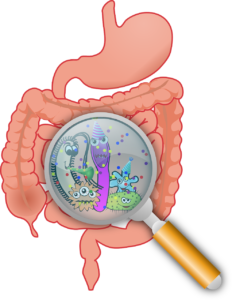Bloating, Flatulence, Constipation, and Diarrhoea? Need Help?
Your stomach is one of the hardest working systems in your body.
Meal after meal, it hustles to digest your food and extract the nutrients required to sustain you.
Despite its solid work ethic, your belly can experience occasional performance hiccups, leading to digestive symptoms.
While many of these are normal, others may indicate something more serious.
Read on to discover what your symptoms say about your stomach function and ways to improve them.

Normal, Everyday Symptoms: Transient Belly Bloating
What is it?
Short-lived abdominal swelling due to trapped gas.
What causes it?
During and after meals, your gut produces enzymes and acids that break down food, creating gas during this process.
While bloating isn’t considered normal, it commonly occurs if you deviate from your standard diets, such as eating larger portions, high-fat meals or foods that are more difficult to break down, including excess carbohydrates and fibre.
These place more burden on your digestive processes, subsequently increasing gas production and bloating.
How do you improve it?
While mild bloating generally passes with time, chewing your food thoroughly, consuming smaller meals and spacing out your carbohydrate and fibre intake can help.
Flatulence
What is it?
Farting.
What causes it?
Gas is produced by normal digestive processes, and ‘passed’ at regular intervals.
Additionally, increased fibre, fat or sugar intake can create gas. Your microbiome (gut bacteria) also influences the amount of gas produced as they ferment food to help with your digestion.
How do you improve it?
It is normal to pass wind around 15 times per day. Additionally, the odd smelly fart is no big deal, particularly if caused by an increase in refined, processed foods (who can say no to the occasional slice of pizza?).
However, if you would like to reduce flatulence, moderate your intake of these foods.

Symptoms That Require Attention: Chronic Constipation
What is it?
The infrequent passage of hard poop (less than once daily), is often accompanied by straining, a sense of incompletely emptying the bowel and discomfort.
What causes it?
Insufficient fibre or reduced fluid intake can slow your transit time (the time it takes for your food to travel from your mouth through to the other end), making you less ‘regular’.
Dysbiosis (an imbalance in the types and levels of gut bacteria) can also influence digestive processes and reduce your transit time.
Additionally, chronic constipation is associated with irritable bowel syndrome (IBS), a condition that affects the function of the bowel.
How do you improve it?
Consume more fibre-rich foods, including fruit and vegetables, and drink enough water.
Prebiotic and probiotic supplements, such as the Metagenics Ultra Flora GI Regulate, may also support bowel regularity and provide relief for symptoms of medically diagnosed IBS.
Diarrhoea
What is it?
Soft, loose or watery stool that occurs more than three times daily.
What causes it?
Diarrhoea may be a symptom of a bacterial or viral infection, such as gastroenteritis, or be related to certain medications, particularly antibiotics.
Additionally, IBS and inflammatory bowel disease (IBD), a condition involving inflammation of the digestive tract, may cause diarrhoea.
How do you improve it?
IBS and IBD are serious conditions that require a professional diagnosis and care from a Health Practitioner.
However, if your symptoms are associated with antibiotic use, Metagenics Ultra Flora Intensive Care may help to restore healthy intestinal bacteria and relieve diarrhoea.
Malodorous Gas
What is it?
Farts that clear a room.
What causes it?
Your microbiome consists of a range of bacteria (38 trillion microbes!) that help digestion by fermenting your food, particularly fibre.
Imbalances in the levels of different bacterial species can lead to increased gas production with a pungent odour.
How do you improve it?
Metagenics Ultra Flora Intensive Care provides three specific probiotic strains (types of bacteria), Lactobacillus rhamnosus (LGG®), Saccharomyces cerevisiae (boulardii) and Bifidobacterium animalis ssp lactis (BB-12®), which have been shown to help restore a healthy balance of bacteria within your microbiome.

Abdominal Pain
What is it?
Sharp, dull, stabbing, cramp-like, or twisting pain in your abdomen. Most people experience occasional gut discomfort, however severe gut pain that is episodic, regular or continuous requires assessment, particularly if accompanied by other symptoms such as fever, changes to your poop, nausea and/or vomiting.
What causes it?
Abdominal pain has many potential causes, the most common being gas pain, food intolerances or allergies, or indigestion. However, abdominal pain can also be a sign of something more serious, including appendicitis, gallstones, ulcers, infections, kidney stones, and many other conditions.
How do you improve it?
If gut pain has become a pattern rather than a one-off incident, seek guidance from a healthcare professional.
Ditch the Gut Glitches
Don’t let your gut feelings bum you out! Instead, switch up your diet and lifestyle habits and rid yourself of symptoms such as bloating, gurgles and gas.
If you regularly experience one or more problematic symptoms, particularly if they’re new or getting worse, consult with a Natural Health Practitioner at Your Wellness Centre for further investigation to devise an individualized comprehensive plan of attack that is suitable for you.
Our healthcare practitioners have a suite of testing available to investigate the driver behind your symptoms.
A stool analysis test enables us to identify all of the bacteria and other microorganisms that inhabit your gut and how they contribute to your gut function and digestive symptoms.
You can read more about MetaBiome™ testing here.


 But, if your gut microbiome (or gut ecosystem) is not as good as it could be and needs a little attention, life in general and even your waistline may be quite uncomfortable.
But, if your gut microbiome (or gut ecosystem) is not as good as it could be and needs a little attention, life in general and even your waistline may be quite uncomfortable. Dysbiosis and bloating have also been linked with digestive disorders such as
Dysbiosis and bloating have also been linked with digestive disorders such as 